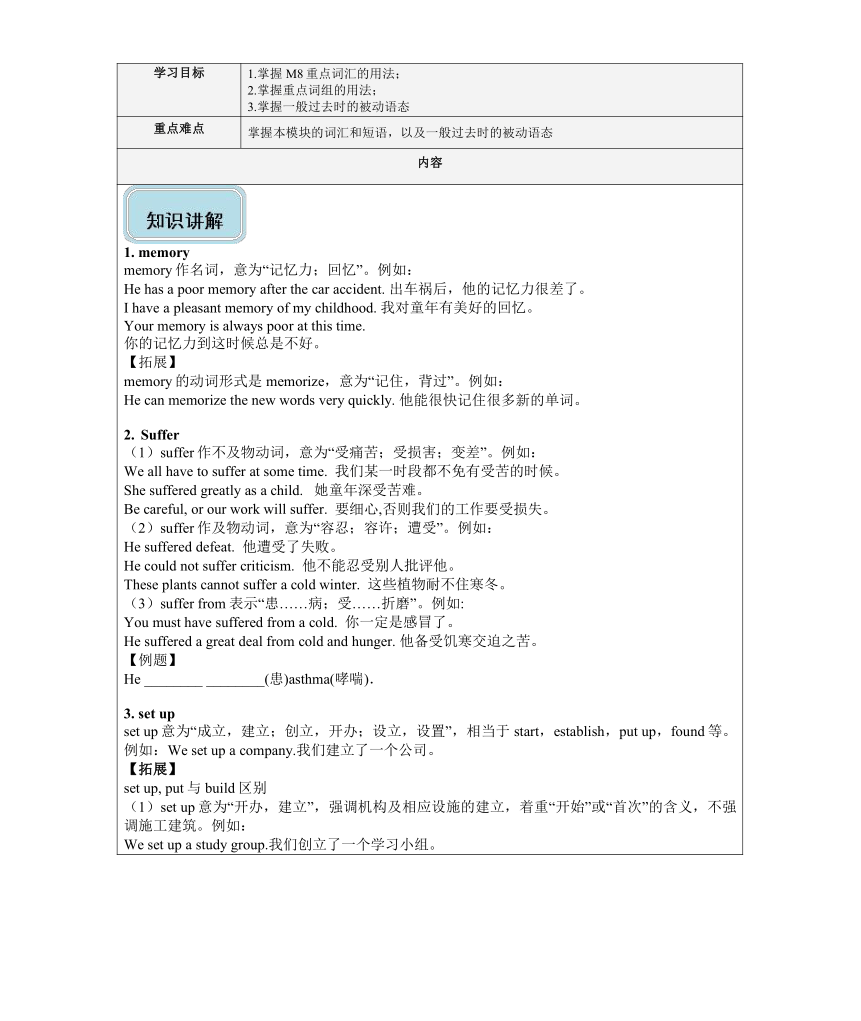
学习目标 1.掌握M8重点词汇的用法; 2.掌握重点词组的用法; 3.掌握一般过去时的被动语态 重点难点 掌握本模块的词汇和短语,以及一般过去时的被动语态 内容 1. memory memory作名词,意为“记忆力;回忆”。例如: He has a poor memory after the car accident. 出车祸后,他的记忆力很差了。 I have a pleasant memory of my childhood. 我对童年有美好的回忆。 Your memory is always poor at this time. 你的记忆力到这时候总是不好。 【拓展】 memory的动词形式是memorize,意为“记住,背过”。例如: He can memorize the new words very quickly. 他能很快记住很多新的单词。 Suffer (1)suffer作不及物动词,意为“受痛苦;受损害;变差”。例如: We all have to suffer at some time. 我们某一时段都不免有受苦的时候。 She suffered greatly as a child. 她童年深受苦难。 Be careful, or our work will suffer. 要细心,否则我们的工作要受损失。 (2)suffer作及物动词,意为“容忍;容许;遭受”。例如: He suffered defeat. 他遭受了失败。 He could not suffer criticism. 他不能忍受别人批评他。 These plants cannot suffer a cold winter. 这些植物耐不住寒冬。 (3)suffer from表示“患……病;受……折磨”。例如: You must have suffered from a cold. 你一定是感冒了。 He suffered a great deal from cold and hunger. 他备受饥寒交迫之苦。 【例题】 He _____ _____(患)asthma(哮喘). 3. set up set up意为“成立,建立;创立,开办;设立,设置”,相当于start,establish,put up,found等。例如:We set up a company.我们建立了一个公司。 【拓展】 set up, put与build区别 (1)set up意为“开办,建立”,强调机构及相应设施的建立,着重“开始”或“首次”的含义,不强调施工建筑。例如: We set up a study group.我们创立了一个学习小组。 (2)put up意为“搭建,搭起”,着重指建造或搭起一个具有一定高度的具体的物体。在口语中set up与build也有此意。例如: It’s going to rain. Let's put up the tent. 天要下雨了,我们把帐篷搭起来吧。 (3) build意为“建设,建立,建造”,是使用广泛的非延续性动词,侧重于施工建筑,常指建造房屋、桥梁、道路、高楼等大型建筑物。例如: The workers are building railways.工人们在修建铁路。 【例题1】 UNICEF was _____in 1946. It works to help children live a better life. A.set up B.put up C.picked up D.turned up ② set up是“动词+副词”型短语,后接代词作宾语时,代词要放在set和up之间,与set相关的短语:set off 出发,动身 set out 出发;启程;开始工作 set about 着手做 【例题2】 —All the oil in the world will have _____ some day. —Yeah. What shall we use for power at that time? given away B.put away C.run out D.set out 4. success success 表示抽象意义的“成功”,是不可数名词;表示具体意义的“成功的人或事”, 则是可数名词。例如: Failure is the mother of success. 失败是成功之母。 His new book was a great success. 他新出版的书获得了巨大成功。 【拓展】 (1)succeed 表示“成功”,是不及物动词;表示做某事做成功了,succeed 后通常接in doing sth。例如: His plan succeeded.他的计划成功了。 At last he succeeded in solving the problem. 他终于把那个问题解决了。 She succeeded in (passing) the exam. 她考试及格了。 (2)successful作形容词,意为“成功的”。例如: The performance was successful. 演出很成功。 It was a successful e ... ...
~~ 您好,已阅读到文档的结尾了 ~~